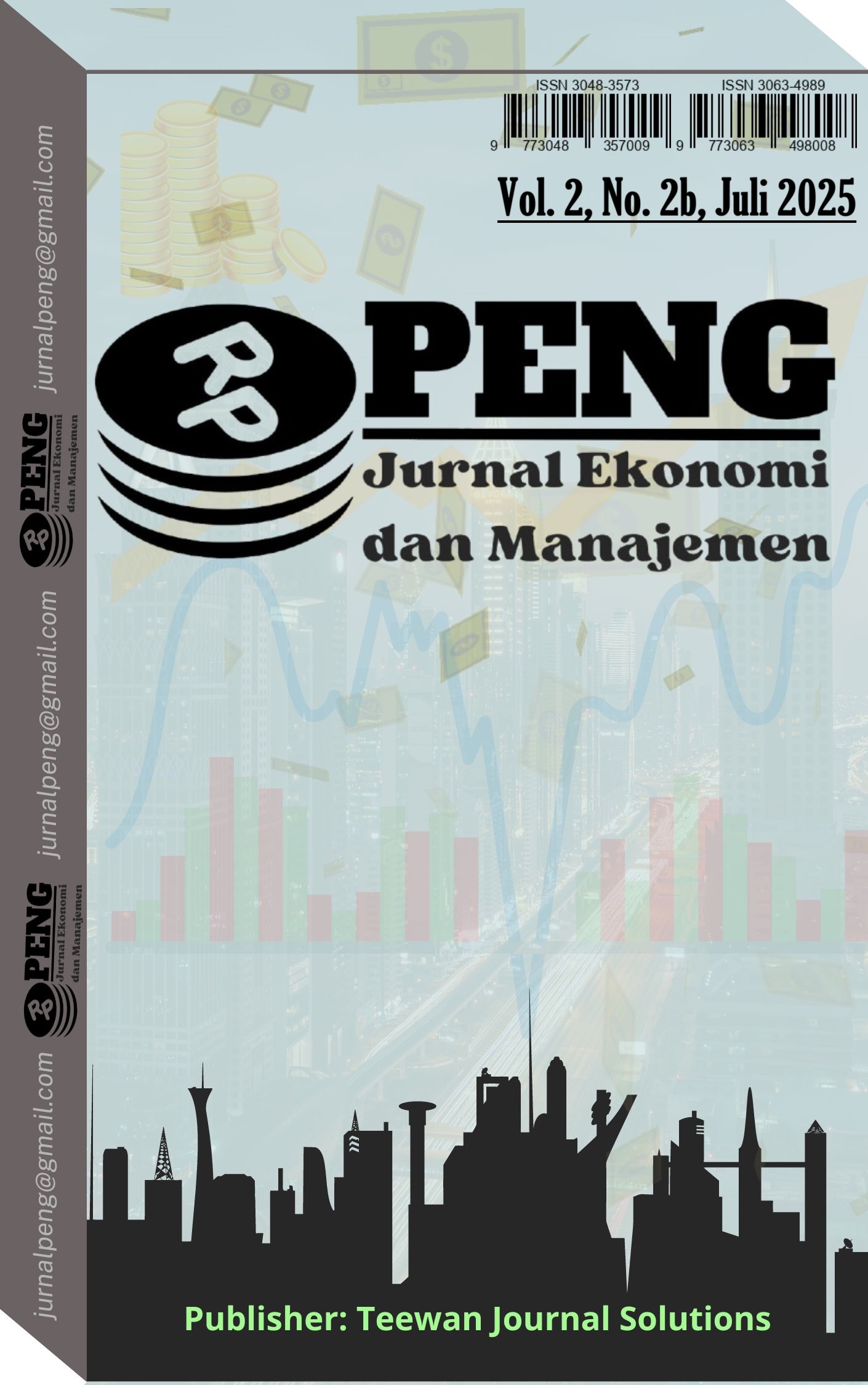Digitalization of Waqf Accounting: A Systematic Review of the Role of Technology in Waqf Governance
DOI:
https://doi.org/10.62710/nrh0mk91Keywords:
Digitalization, Waqf Accounting, Waqf Governance, Information TechnologyAbstract
The objective of this research is to systematically evaluate the influence of technological advancements on the digitization of waqf accounting and its subsequent effects on enhancing transparency, accountability, and efficiency within waqf governance frameworks. Employing the Systematic Literature Review (SLR) methodology alongside the PRISMA guidelines, a total of 31 pertinent scholarly articles were meticulously selected from a range of international databases, including Scopus, ScienceDirect, and Google Scholar. The findings indicate that the integration of information technology, particularly through digital-based accounting information systems, has significantly augmented reporting efficiency and bolstered public trust in waqf management practices. Furthermore, technological innovations such as blockchain, sharia fintech platforms, and the tokenization of waqf assets are progressively being implemented, albeit they continue to encounter challenges concerning regulatory frameworks, human resource preparedness, and digital infrastructure. The review advocates for the formulation of national standards for digital waqf accounting systems, the enhancement of regulatory frameworks and digital literacy initiatives, as well as the establishment of strategic partnerships between waqf institutions and technology providers. This research offers substantial contributions to the comprehension of the transformation occurring within waqf governance in the context of the digital era and paves the way for further scholarly inquiry into the development of a sustainable, values-driven digital waqf model grounded in Islamic principles.
Downloads
References
Astina, R., & Aprilia, H. (2025). Hukum digitalisasi wakaf dengan menggunakan visualisasi humanities. Iqtishaduna: Jurnal Ilmiah Mahasiswa Hukum Ekonomi Syari’ah, 778–798. https://doi.org/10.24252/iqtishaduna.vi.55606
Auna Nida Ulhusna, N. S., Azizah, N., Putri Dinanti, S., & Adriansyah, Z. (2024). Peran wakaf digital dalam mencapai tujuan pembangunan berkelanjutan(SDG’s). OIKONOMIKA : Jurnal Kajian Ekonomi dan Keuangan Syariah, 5(1), 52–63. https://doi.org/10.53491/oikonomika.v5i1.1128
Dhihan Arwin, N., Nawwar, F. A., & Br. Purba, V. (2024). Dampak psak 112 terhadap transparansi dan akuntabilitas lembaga wakaf. Jurnal El Rayyan: Jurnal Perbankan Syariah, 3(2), 149–160. https://doi.org/10.59342/jer.v3i2.645
Hasan, Fajriati, F., & Sunarsih, U. (2025). ANALISIS PENERAPAN PSAK 112 PADA NAZHIR WAKAF DOMPET DHUAFA JAKARTA. Musytari : Jurnal Manajemen, Akuntansi, Dan Ekonomi, 16(2), 71–80. https://doi.org/10.8734/musytari.v16i2.11905
Hasanah, I. (2021). Sosialisasi Penerapan Sak Syariah-Psak 112 tentang Akuntansi Wakaf guna Pembuatan Laporan Keuangan Bagi Para Nazhir di Lingkungan Badan Wakaf Indonesia (BWI) Perwakilan Propinsi Kalimantan Selatan. Khidmatuna: Jurnal Pengabdian Kepada Masyarakat, 2(1), 1–11. Retrieved from https://ejournal.iaiskjmalang.ac.id/index.php/Khidmat/article/view/317
Hijriah,S., Hidayatullah,M.R., Salsabillah,S., & Jannah,M. (2024). PENERAPAN AKUNTANSI WAKAF DI PROVINSI BANTEN. Musytari : Jurnal Manajemen, Akuntansi, Dan Ekonomi, 10(12), 21–30. https://doi.org/10.8734/musytari.v10i12.7573
Hussin, S. N. A., Nik-Wan, N. Z., Abdullah @ Abd Aziz, A., & Saidi, N. (2022). An Exploratory Study of Waqf Accounting and Reporting Practices Among Mosques in Kelantan: Mengkaji Amalan Perakaunan dan Pelaporan Wakaf di Kalangan Masjid di Kelantan. Jurnal Pengajian Islam, 125–139. Retrieved from https://jpi.uis.edu.my/index.php/jpi/article/view/190
Iman, N., Kurniawan, E., & Santoso, A. (2020). Integrasi dan digitalisasi sistem informasi manajemen aset wakaf(Simas waqfuna). KOMIK (Konferensi Nasional Teknologi Informasi Dan Komputer), 4(1). https://doi.org/10.30865/komik.v4i1.2567
Maisyarah, A., & Hadi, K. (2024). Implementasi Model Pengelolaan Wakaf Berbasis Digital dalam Meningkatkan Tujuan Pembangunan Berkelanjutan (Sdg’s). Jurnal Ilmiah Ekonomi Islam, 10(1), 887–894. https://doi.org/10.29040/jiei.v10i1.12079
Nasywa,A.Z., & Lahuri,S.B. (2025). Teknologi Blockchain sebagai Upaya Akuntabilitas Wakaf. SOSMANIORA: Jurnal Ilmu Sosial Dan Humaniora, 4(1), 99–110. https://doi.org/10.55123/sosmaniora.v4i1.4964
Nazah, R. K. (2022). Optimalisasi Potensi Wakaf Tunai sebagai Penggerak Bisnis Melalui Pengembangan Fintech Wakaf di Era Digitalisasi. Nidhomiya: Research Journal of Islamic Philanthropy and Disaster, 1(1), 26-34. https://doi.org/10.21154/nidhomiya.v1i1.722
Nurhidayah, ayu, & Yazid, M. (2024). INOVASI DIGITAL DALAM PENGELOLAAN ZAKAT DAN WAKAF. El-Iqtishod: Jurnal Ekonomi Syariah, 8(2), 48–64. https://doi.org/10.70136/el-iqtishod.v8i2.531
Pramewari, M.P.,Mutiara,D., Azizah,S. & Aji,G. (2024). Mengkritisi Implementasi Standar Akuntansi Syariah dalam Pengelolaan Wakaf di Era Society 5.0. Profit: Jurnal Manajemen, Bisnis Dan Akuntansi, 3(3), 80–89. https://doi.org/10.58192/profit.v3i3.2175
Rahmawati, Thamrin, H., Guntoro, S., & Kurnialis, S. (2021). Transformasi digital wakaf bwi dalam menghimpun wakaf di era digitalisasi. Jurnal Tabarru’: Islamic Banking and Finance, 4(2), 532–540. https://doi.org/10.25299/jtb.2021.vol4(2).8375
Saidu, O. S. (2019). Highlighting the Links between Islamic Accounting and the Cash Waqf. International Journal of Islamic Business and Economics (IJIBEC), 3(2), 146–155. https://doi.org/10.28918/ijibec.v3i2.1404
Sakinah, N.Y.,Susi,S.,Hasbi,H.(2025). Analisis Pencatatan dan Pelaporan Wakaf dalam Meningkatkan Kesejahteraan Masyarakat di Kecamatan Sibulue Kabupaten Bone. Jurnal Serambi Ekonomi dan Bisnis.Vol.8 No.1.2025. https://ojs.serambimekkah.ac.id/serambi-ekonomi-dan-bisnis/article/view/8655
Salman, K. R., & Mukadar, A. F. (2022). Pemahaman Nazhir dan Penerapan Sistem Akuntansi Wakaf Berdasarkan PSAK 112. Jurnal Ilmiah Ekonomi Islam, 8(2), 1169–1180. https://doi.org/10.29040/jiei.v8i2.4814
Salman, K. R., Rithmaya, C. L., Mei Murni, N. S. I., Budiana, K. M., & Djunaedi, A. Z. (2021). PEMBERDAYAAN NAZHIR MELALUI PERANCANGAN SISTEM AKUNTANSI WAKAF. Jurnal KeDayMas: Kemitraan Dan Pemberdayaan Masyarakat, 1(1), 41–50. https://doi.org/10.14414/kedaymas.v1i1.2314
Salsabila, F.L.,Rini, & Hidayat,M.F. (2024). Strengthening accountability mechanisms in waqf institutions: A systematic literature review. Journal of Sharia Economics, 5(2), 174–194. https://doi.org/10.22373/jose.v5i2.5343
Sudi, D. M., Sarif, A., Wang, Y., & Zou, G. (2024). Optimizing waqf as a socio-economic financing instrument in the digital era. Sharia Oikonomia Law Journal, 2(2), 139–150. https://doi.org/10.70177/solj.v2i2.1157
Syahbibi,R.,& Hisan,M. (2023). “Potensi Digitalisasi Wakaf Di Indonesia dalam Era Society 5.0”, Syariati: Jurnal Studi Al-Qur’an dan Hukum, 9(2), pp. 237 - 246. doi: https://doi.org/10.32699/syariati.v9i2.5333.
Wildana, M. D. A., & Imamia, T. L. (2022). Waqf in the 21st century: The implementation of blockchain and smart contract technology. Journal of International Conference Proceedings, 5(1), 456–466. https://doi.org/10.32535/jicp.v5i1.1774
Zahara, F., Sugiharto, B., & Nasution, Y. S. J. (2024). Computational Architecture of Digital Waqf in Indonesia. Jurnal Penelitian Pendidikan IPA, 10(12), 10263–10268. https://doi.org/10.29303/jppipa.v10i12.9627
Downloads
Published
Issue
Section
License
Copyright (c) 2025 Wali Saputra (Author)

This work is licensed under a Creative Commons Attribution-NonCommercial-ShareAlike 4.0 International License.










